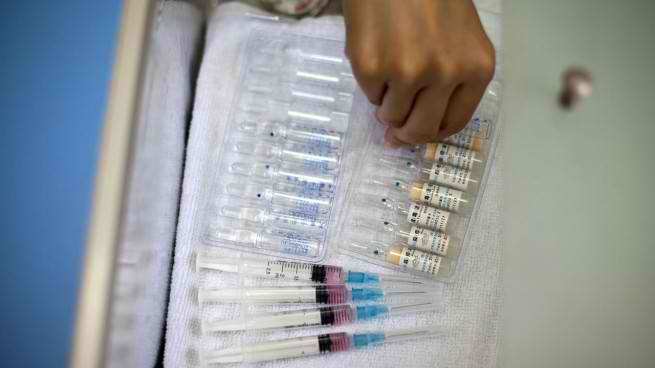Many parents hold firm to anti-vaccine beliefs
With the state gripped by a measles outbreak, many California families are taking different approaches to protecting their kids from the severely contagious virus.
Gary Monahan, a councilman for the city of Costa Mesa, remembers his son’s temperature spiking after getting the first dose of the MMR (measles, mumps, and rubella) vaccine. The child then landed in the hospital with a whooping cough after his next round of vaccinations, and when he turned 3 ½, was diagnosed with autism.
The experience shaped Monahan’s approach to raising his children. Now Manahan, the father of six, has skipped vaccinations for his last four children without pause, despite recent health concerns of the measles outbreak which spread rapidly from the Disneyland theme parks after an exposure in December.
“How do I say this without sounding crazy?” he said. “I don’t want anyone to get measles…but you have to make it easier for the parents through the health system to do it the right way. Pounding three live viruses into somebody at 1 year old is devastating.”
Studies show measles can be especially severe in babies, toddlers and pregnant women, as well as other adults, according to the US Centers for Disease Control and Prevention. Infants younger than 12 months are especially vulnerable before they get their first dose of the MMR vaccine.
MMR is 97 percent effective at preventing measles, according to the Centers for Disease Control and Prevention.
However, a widespread anti-vaccination movement in the US has been fueled by parents’ fears that vaccines are just not safe for every child. Like Monahan, many worry that the measles vaccine can cause autism—a theory that has been thoroughly discredited by numerous scientific research.
All states require children to get certain vaccinations to enroll in school, but California is among 20 states that allows parents to opt out with exemptions and personal belief waivers.
Despite the current second-worst measles outbreak in 15 years, which has already affected close to 100 in eight different states, many parents aligned with the anti-vaccine movement are unyielding.
“What if they experience it,” said Dee Klocke, who has two unvaccinated children. “So what? Maybe I’m saying that just because it hasn’t happened yet.”
In California, the number of parents who refuse to vaccinate their kindergarten-age children has declined for the first time in a dozen years, according to a Los Angeles Times data analysis.
Still, many areas and families are resisting the treatments for a variety of reasons, including developmental problems, religious or philosophical reasons. For instance, wealthy and well-educated coastal Orange County area has one of the highest rates of vaccine exemptions in some school districts.
“It’s such an unpopular thing to not vaccinate,” said one mother from Mission Viejo, arguing her case that the vaccinations do not work. Instead, she ensures her children have a vitamin-rich diet and an optimal nutrition level. “I don’t want to be paraded through the mud for my choice. But you have to be informed, you have to be an expert on your own child’s health.”
“Once you vaccinate your child, you can never un-vaccinate,” she said.
Combating the movement, many doctors’ offices are refusing to see children whose parents won’t get them vaccinated. They hope the “tough love” strategy will lead stubborn parents to change their minds—or at least reduce risk to other children in the office.
“Parents who choose not to give measles shots, they’re not just putting their kids at risk, but they’re also putting other kids at risk—especially kids in my waiting room,” said Los Angeles pediatrician Dr. Charles Goodman.
The American Academy of Pediatrics says doctors should bring up the importance of vaccinations during visits, but should also respect a parent’s wishes unless there is significant risk to the child.
“In general, pediatricians should avoid discharging patients from their practices solely because a parent refuses to immunize his or her child,” the group said.
However, if the relationship between patient and doctor becomes unworkable, the doctor can encourage the unvaccinated patient to see another physician.
Measles symptoms include fever, runny nose, cough, and a slowly-spreading rash all over the body. The virus spreads easily through the air and in enclosed spaces.
Nearly all US cases in recent years have been linked to travelers who caught the virus while abroad. Still, the CDC and state health officials encourage everyone to get vaccinated to avoid risk, contain a rapidly-spreading virus, and prevent future outbreaks.
(With reports from Associated Press and Los Angeles Times)



